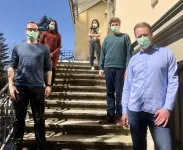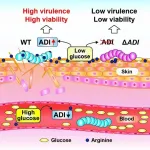Why SARS-CoV-2 replicates better in the upper respiratory tract
2021-03-31
(Press-News.org) "SARS-CoV-2 and SARS-CoV are highly similar genetically, generate a homologous repertoire of viral proteins, and use the same receptor to infect human cells. However, despite these similarities, there are also important differences between the two viruses", says Ronald Dijkman from the Institute for Infectious Diseases (IFIK) at the University of Bern. For example, SARS-CoV infection is characterized by severe disease and inflammation in the lower respiratory tract and infected individuals are only contagious after the onset of symptoms, making it easier to identify and interrupt infection chains.
In contrast, SARS-CoV-2 preferentially replicates in the upper airways (nasal cavity, pharynx, trachea) and can be efficiently transmitted from one individual to another before the appearance of disease symptoms. Moreover, the outcome of SARS-CoV-2 infection varies widely from person to person, and can manifest as asymptomatic, mild, or severe disease. Older people as well as individuals with certain underlying medical conditions (heart conditions, diabetes, cancer) are at greater risk of developing severe illness, which is often associated with infection of lower respiratory tissues, high levels of inflammation, and lung failure.
Temperature is key
To better understand why infections with SARS-CoV and SARS-CoV-2 result in such different clinical outcomes, researchers from the University of Bern used specialized human airway cell cultures to investigate the impact of respiratory tract temperatures on SARS-CoV and SARS-CoV-2 replication. The cells originate from human samples and mimic the complexity of the cells found in the respiratory tract. They grow in special containers, are nourished from the bottom side and are exposed to air on the top side, just like the cells in the human trachea. The cultures also make mucus and have cilia that beat very quickly. "Because the organization of these cells greatly resembles the cells found in human tissues, they are a relevant system that can be used in a laboratory to study respiratory viruses", Dijkman explains.
The researchers have now used this existing model for the first time to study the effects of respiratory temperatures on SARS-CoV and SARS-CoV-2 replication. They found that temperature plays an important role as SARS-CoV-2 preferred to replicate at temperatures typically found in the upper airways (33°C). Colder incubation temperatures allowed the virus to replicate faster and to a higher extent than when infections were carried out at 37°C to mimic the lower lung environment. Unlike SARS-CoV-2, replication of SARS-CoV was not impacted by different incubation temperatures. The experiments were conducted both in the high security laboratory of the IVI in Mittelhäusern and in the biosafety laboratory of the Institute for Infectious Diseases (IFIK) at the University of Bern in the building of sitem-insel, the Swiss Institute for Translational Medicine and Entrepreneurship.
Temperature also influences the response from the epithelium
The team also analyzed which genes are turned on and off after infection with SARS-CoV and SARS-CoV-2 to understand how cells from the human respiratory tract respond to infection and which innate immune programs are activated. The innate immune system is our body's "first line of defense" against invading pathogens and is crucial not only to contain the invader, but also to teach other branches of the immune system how to react appropriately.
When mimicking the conditions found in the upper airways (33°C), the team found that infection with SARS-CoV-2 did not stimulate the innate immune response within these cells as strongly as it did when they mimicked conditions found in the lower respiratory tract (37°C). "Since the strength of the innate immune response can directly influence the degree of viral replication, this may help explain why SARS-CoV-2 replicated more efficiently at lower temperatures", says Dijkman. Although mounting a strong innate immune response against the virus is generally beneficial, it is important to note that in some cases the innate immune response can become overactivated. This in turn can be detrimental to the infected individual, as high levels of inflammation can also induce tissue damage and accelerate disease progression - a phenomenon that is often seen in patients suffering from severe COVID19.
"The detailed analysis of SARS-CoV-2 replication and the temperature-induced changes in the host innate immune defense mechanisms helps explain why SARS-CoV-2 replicates so well in the upper respiratory tract, and is perhaps why SARS-CoV-2 exhibits higher human-to-human transmissibility than SARS-CoV", Dijkman explains.
Important knowledge to fight coronavirus infections
The use of this authentic cell culture model in a controlled laboratory setting proved to accurately reflect the different behavior of two similar viruses in the context of a pandemic. "This unique system provides insight into the molecular battle that occurs between virus and host during an infection and underscores the importance of subtle changes in the virus-host microenvironment that may impact virus replication and propagation", says Dijkman. Understanding which key players are involved in this process, and whether they favor the host or virus, opens new opportunities for the establishment of highly targeted intervention strategies and the development of novel pharmaceutical compounds that will help combat coronavirus infections.
INFORMATION:
This work was supported by the European Commission (Marie Sklodowska-Curie Innovative Training Network "HONOURS"), the Swiss National Science Foundation SNSF (Special call on Coronaviruses), and the German Federal Ministry of Education and Research, project RAPID.
Institute for Infectious Diseases (IFIK)
The IFIK is part of the Faculty of Medicine at the University of Bern, and combines diagnostic services, teaching and research in the fields of virology, bacteriology, mycology, parasitology and immunological infection analysis. The IFIK also houses the Biosafety Centre which assists research with highly pathogenic microorganisms. The research of the Experimental Virology Group at the IFIK is focused on investigating how emerging respiratory pathogens, including influenza viruses and coronaviruses, transmit from animals to humans.
https://www.ifik.unibe.ch/
Institute of Virology and Immunology (IVI)
The IVI is Switzerland's reference laboratory for the diagnosis, monitoring and research of highly infectious epizootic diseases, including viral zoonoses (infectious diseases that are transmissible between animals and humans). The IVI is also responsible for the approval and monitoring of animal vaccines and immune sera for use in veterinary medicine. As part of a cooperation agreement with the Vetsuisse faculty of the University of Bern, the IVI is also responsible for teaching and research in the fields of virology and immunology. Research activities encompass both basic and applied research and provide an important basis for the control of epizootic diseases and zoonoses. The IVI reports to the Federal Food Safety and Veterinary Office (FSVO).
https://www.ivi.unibe.ch/
[Attachments] See images for this press release:

ELSE PRESS RELEASES FROM THIS DATE:
2021-03-31
Companies could be hiring that bad boss on purpose. According to new research in the Journal of Business Ethics, the "dark" personality traits - questionable ethical standards, narcissistic tendencies - that make a boss bad also make that person much more likely to go along with manipulating earnings and may be the reason they got the job in the first place.
Co-authors Nick Seybert (University of Maryland's Robert H. Smith School of Business), Ling Harris (University of Nebraska-Lincoln), Scott Jackson (University of South Carolina) and Joel Owens (Portland State University) studied the process of hiring executive ...
2021-03-31
ATLANTA -- Assisted living communities can improve the quality of life for residents with dementia by approaching them as individuals and attempting to include all residents in activities, according to a study led by a Georgia State University gerontology researcher.
The typical "activity programming" at many assisted living residences can leave people with dementia on the sidelines, according to the study, "Meaningful Engagement Among Assisted Living Residents With Dementia: Successful Approaches," published in the Journal of Applied Gerontology.
The study found that the keys to improving ...
2021-03-31
ANN ARBOR--By April last year, up to 28 free-standing alternate care sites ranging in size from 50 to 3,000 beds were underway or finished in the U.S.--the Michigan Medicine Field Hospital among them.
This 500-bed alternate care site was planned and construction underway from March through May to meet the estimated surge in COVID-19 patients, expected to overrun hospitals nationwide and in Michigan. Sue Anne Bell, assistant professor of nursing and a disaster expert, was one of the field hospital's five-member leadership team.
Bell and her ...
2021-03-31
But the study also shows for the first time that performance may be improved by using super recognisers - people who are very skilled at recognising faces. It also reveals that masks do make recognising someone's emotions more difficult.
There are many questions surrounding face masks and the impact that masks will have on face identification. Can we recognise the faces of people who we know well if they are wearing a mask? And, relevant to policing and security scenarios or a supermarket ID check, can an unfamiliar face be recognized across images if it is masked? And how do masks impact our ability to recognize a person's emotions?
Dr Noyes is Senior Lecturer in Cognitive Psychology and conducted the study, published by the Royal ...
2021-03-31
Research conducted in U.S. national parks has focused largely on five iconic parks, with more than a third of academic papers focused on Yellowstone National Park, researchers from North Carolina State University found in a new analysis.
They also found that the number of publications per year increased during the 1990s and 2000s, but has dropped since 2013. The findings, published in the journal Conservation Science and Practice, were drawn from an analysis of nearly 7,000 published, peer-reviewed studies conducted at U.S. designated national parks since 1970.
"Looking at the data was a surprise and perhaps a wake-up call," said the study's lead author Jelena Vukomanovic, assistant professor of ...
2021-03-31
Forty million people living in the Kanto region of Japan, which includes Tokyo, may be able to blame a meandering ocean current for increasing hot and humid summers, according to an analysis conducted by an international team of researchers. The Kuroshio Current flows north, bringing warm water from the tropics to Japan's southern coast. Since 2017, however, it has meandered off its traditional path, turning south before continuing north again. Now, scientists have found that the "large meander" is responsible for the uptick in humidity and temperature.
The researchers, from Tohoku University in Japan and the University of Hawaii in the United States, published ...
2021-03-31
Osaka, Japan - Streptococcus pyogenes is one of the most important bacterial causes of human skin infections. If S. pyogenes invades deep into the tissue, it can cause life-threatening illnesses, such as sepsis and toxic shock. With its limited supply of carbohydrates, the skin is generally an effective barrier against infection and not a good surface for the survival of S. pyogenes. To survive successfully and invade deep into the tissue, bacteria must be able to find a source of nutrients and also evade the skin's immune defenses.
Now, an international ...
2021-03-31
Scientists from Tomsk Polytechnic University jointly with Russian colleagues and researchers from Technical University of Denmark the first time have experimentally proved the existence of a two-dimensional (2D) curved flux of plasmonic quasiparticles, a plasmonic hook. A flat 2D hook is smaller than a 3D hook and possesses new properties, due to them, the researchers consider it as the most promising transmitter in high-speed microoptical circuits. The research findings are published in Applied Physics Letters (IF: 3,597; Q1) academic journal.
Electrons transmit information in existing calculation devices. The scientists suppose if electrons are replaced ...
2021-03-31
New research shows how drinking sugary beverages early in life may lead to impaired memory in adulthood.
The study, published today in Translational Psychiatry, also is the first to show how a specific change to the gut microbiome -- the bacteria and other microorganisms growing in the stomach and intestines -- can alter the function of a particular region of the brain.
According to the Centers for Disease Control and Prevention, sugar-sweetened beverages are a leading source of added sugars in Americans' diets. Nearly two-thirds of young people in the United States consume at least one sugary drink each day.
Neuroscientist Scott Kanoski, associate professor of biological sciences at the USC Dornsife College of Letters, Arts and Sciences, has studied the link between ...
2021-03-31
LA JOLLA, CA--The faster-spreading B.1.1.7 variant of SARS-CoV-2 first detected in the United Kingdom, the coronavirus that causes COVID-19, is quickly on its way to becoming the dominant variant of the virus in the United States, according to a study from scientists at Scripps Research and the COVID-19 test maker Helix.
The findings, which appear today in Cell, suggest that future COVID-19 case numbers and mortality rates in the United States will be higher than would have been otherwise. The analysis suggests that the variant, which has been detectable in an increasing proportion of SARS-CoV-2 samples, is 40-50 percent more transmissible than SARS-CoV-2 lineages that were previously dominant. Other studies have found ...
LAST 30 PRESS RELEASES:
[Press-News.org] Why SARS-CoV-2 replicates better in the upper respiratory tract


